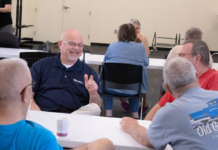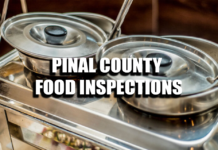So many posts from friends end with “take care.” It seems a simple salutation at the end of a letter or social media post, however it is an important message.
I am always seeking ways to improve my mental health and wellbeing, to take care in my choices and appreciate them to make life better, not more chaotic.
I start with managing stress and anxiety. Today, we have more anxiety from threats to our wellbeing and more global threats, from a pandemic to warfare.
I recall a story after my stepfather’s death; I was 31. In my first experience with grief therapy, I was taking a stress management workshop. I invited my mother, who was experiencing symptoms of grief at our loss.
During a break, we were listening to other participants discuss their experiences and she turned to me and said, “I think I am the only one in here not crazy.”
I asked her, “What does that make me?”
She expressed the time-held stigma that if something was happening mentally, it was “crazy.” We are not crazy when coping with mental health concerns.
Stress and anxiety have the greatest prevalence, no matter the age. We all have issues with stress in many life circumstances. No one is exempt. We are not crazy if we struggle with coping. Mental health affects our physical health.
Stress is normal in everyday life. Without stress, we are unmotivated. When we experience stress, the brain, specifically the hypothalamus, reacts by releasing stress hormones, the same hormones that make you sense “fight, flight or freeze.” The heart beats faster, breathing becomes shallow and fast, and extremities become cold and sometimes blue, as the heart draws blood in around the heart and lungs to ready the body for survival defense.
This response from the primitive brain, the brain stem, is automatic for survival. Stress can lead to overeating or substance abuse, as a means of self-medication.
Illnesses are affected by emotional response, including high blood pressure, stroke, heart attack, diabetes and heartburn.
The brain provides us with warning systems and messages on our health. Dealing with intense worry can be difficult. I encourage you not to worry too much, find ways to relax and learn to stay calm. We often need to pause and ask, is this about me, do I need to do something, is there a solution, an action I can take to better the situation.
If not, then go find a good laugh.
Five tips to reduce the effects of anxiety:
- Exercise. Even a 10-minute walk can improve sleep, mood and self-esteem. Exercising burns stress hormones, like cortisol, to return balance in the body. It also produces endorphins, the feel-good hormone, and acts as natural painkiller. Exercise improves sleep, which impacts the risk of anxiety and other health issues.
- Monitor caffeine and alcohol use. Caffeine, a stimulant, and alcohol, a depressant, may worsen the stress condition. When anxiety, stress or depression are out of control, seek professional advice for therapy and medication.
- Meditate or practice yoga. Both help slow breathing and teach relaxation responses, internally and externally.
- Eat the right foods. The closer to dirt the healthier.
- Laugh. Nothing is more beneficial than a good laugh with good friends.
This column was first published in the March edition of InMaricopa magazine.

















![Elena Trails releases home renderings An image of one of 56 elevation renderings submitted to Maricopa's planning department for the Elena Trails subdivison. The developer plans to construct 14 different floor plans, with four elevation styles per plan. [City of Maricopa]](https://www.inmaricopa.com/wp-content/uploads/2024/04/city-041724-elena-trails-rendering-100x70.jpg)